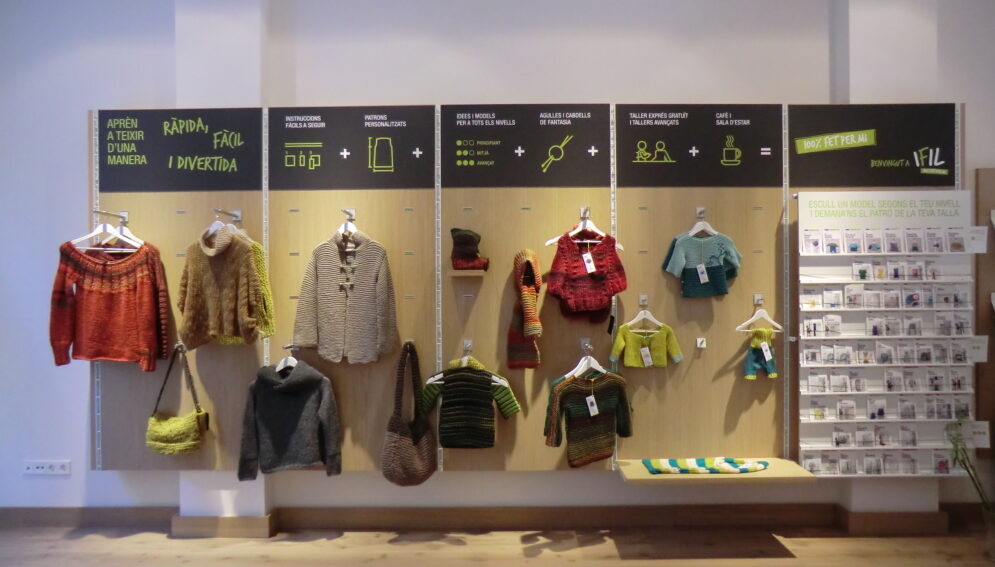Ifil’s strategy. Selling the pleasure of creating something with one’s own hands.
A young woman went on stage on October 27th, 2011. She was dressed for the occasion: in the wool sweater she herself had knitted. On that day, she was awarded a prize that certified her commercial establishment had been voted the most outstanding in the 2011 edition of the “Barcelona Best Shop Award”. Her name? Sílvia López, who together with her associate, Carmen Garcia Mor, runs iFil (i-Thread in English), a business specialised in knitted fashion garments.
At that time, I was part of the jury and can confirm that among us, there was no place for doubt: IFil represented a business model in retail with a very special connotation and sensitiveness. Hence, our absolute unanimity.
There’s something about iFil…
IFil is a shop whose sole purpose is to teach its customers to knit their own textile garments, by offering them everything they need to do so. IFil actually sells the pleasure of creating something with your own hands.
If we only scratch the surface, the shop is no more than a mere example of a specialised enterprise, a kind of business that works well for big cities, but that would certainly go bust if set up in smaller geographic areas.
However, a specialised shop is that which knows a lot about a very definite product category, it is a shop with a trade. This means three things: (1) a narrow assortment (with few categories), (2) but a deep one (it has a remarkable number of items to choose from), and (3) addressed to different customer segments.
This third point doesn’t usually come up in related literature, but it is of vital importance for the sustainability of a specialised business. If the targeted customers aren’t multisegment, the company sales become very limited because they stem from a narrow assortment.
In this case, the segments range from people who never before had touched a knitting needle or who once knew how to but gave up, to those who are enthusiastic practitioners. The challenge for both business partners was to show people how knitting could be easy, fun and fast! Indeed, they have a good command of marketing: they talk about “showing”, which involves much more than just “doing”.
About beginnings
Sílvia and Carmen, the girls with an everlasting smile, share a fondness for design and fashion… and perhaps because of this, they choose to be absolutely unconventional.
Sílvia studied textile design in Paris and learned about the commercial aspect of art. She then worked in a renown online sales company, that offered promotional products, but in the job she missed the possibility to create something with her own hands.
Carmen is an industrial designer, whose grandmother not only taught her how to knit, but also passed on this passion to her.
Both artists met about three years ago and discovered they shared their motivation and values: Why should the road to fashion be paved with impulse consumerism and not with open hearts? On October 23rd 2010, they opened iFil.
Sílvia and Carmen aren’t interested in making their customers discover or recapture the knitting excitement, but rather the excitement of creating their own presents or wearing their creations. This statement contains both humanity and a deep marketing vision (the whole point is not to manufacture a product, yet to enjoy your own production later).
Their business plan paid lots of attention to the details. Take the name, for instance. It includes two elements: “I” (as in me) and “fil” (thread, in Catalan). Moreover, the latter also sounds like “feel” in English, so an English speaker would understand: I-Feel.
The secret to iFil
The founders do not want to be a mere shop of woollen goods, but a non-commercialised area, where customers can learn about knitting in an easy, fun and fast way. The two designers offer examples and ideas for all skill levels, and have prepared very simple and visual instructions for every garment.
The shop is easily read. For starters, one can perceive a central “avenue”, with its sides nearly covered in full by identical and annexed modular pieces of furniture. These structures deserve special attention. Each one of them exhibits a garment as a model, hung from above and placed in the centre, with two possible wool types with which to knit it on either side, as well as the available colour patterns. Underneath, it displays an assortment of balls of yarn, ready for purchase once the customers have made their choice. In a way, the modular structure facilitates the purchase decision: similarly to a waterfall, the customers become excited by a model, enhance their experience through their senses (material textures, colours…), up to the point where they select the items they will buy according to availability. To sum up: customers are taken by the hand from an initial emotion to an easy decision.
Altogether, this exhibition model allows for an interesting psychological sequence: the model-garment guides the clients, helps them reflect on their options, and then finally picture themselves with the future sweater they will make. From the minimisation of risks to the gratifying customisation of results.
One of the key aspects to the business is the pattern that people receive when purchasing the material to knit the garment. In fact, this is the maximum expression of the businesswomen’s will to encourage the hobby. It is indeed a differential way of providing support to customers, inasmuch as it demands an effort in know how and implementation.
Lastly, I would like to highlight another of their business strengths: one main supplier, Katia, a Spanish company that bases its products on good quality and commitment. There are renown retail companies that succeed due to a back office strategy more than to what the public can actually see. That is, iFil suppliers -more than business partners- become accomplices and travel companions.
The subtle touch
The interior design is so simple and clear, it could be considered minimalistic… but it isn’t! Its expression is subtle, intuitive, charming and anthropologically feminine.
Over the lateral modular structures, one can admire strips of cloth surrounding their perimeter. These, joined together, look like a very long scarf with poetic thoughts, revealed in words or by means of evocative pictures. One certainly notices the passion for this hobby-trade in every detail.
The premises don’t only contain products, but also a seemingly endless amount of services for the customers, such as a special day to get advise, or a wide range of activities like the the weekend monographic and the Express Workshop, where customers learn the basics of knitting for free. The artists not only undertake these activities in the shop, but also strive to spread this hobby in city squares.
At the end of the process, all the garments are given a label that reads: “100% made by me”, thus fostering the self esteem of the knitter.
Not only Catalan and Spanish are spoken in the shop, but English too. All three coexist in a friendly atmosphere. The business partners use any of these languages in their warm, empathic and pleasant manner. Their smiles help as much as the techniques they teach.
The result of all these efforts is the founding of a community of knitting lovers, who meet either in the shop or interact through
facebook and the
blog.
Thanks to the award, Sílvia and Carmen have achieved more visibility. By way of example, the following video.
As a consequence, the main source of new customers is mouth to ear, the most reliable way to make a business grow.
Values above all
The shop is a meeting point for those who value knitting. It is abuzz with social activity, especially in the evenings.
“What you do with your own hands isn’t only special because it empowers you, but also because you feel the magic of handmade work, you live the present moment. By doing so, you relax and are moved just by thinking about the person you are going to give this garment to once it’s finished. If it’s not perfect in the end, no worries: life has its flaws, too!” exclaims Sílvia.
The businesswomen -and artists- believe in creativity, simplicity, imagination, calmness and love. And so they declare it publicly in their shop.
Facing challenges
Not everything is perfect. The avalanche of customers doesn’t leave much time to organise the entry of the shop, the area that establishments usually take most care of. For example, at the entrance there is a blackboard with uncountable activities written in chalk, however not all of them updated as the owners can’t always manage to do so.
On the other hand, the challenge of seasonality is another key point, in that it leads to a larger profitability. The business partners tackle this area by proposing suitable materials for those warmer months, together with very creative activities. But above all, they rely on their website to sell to people living in other coordinates.
In a nutshell
Retailing based in humanity provides an irresistible magnetism for customers, which is craved -but not achieved- by the strictly commercial chains, no matter the amount of advertising they invest in.
When you add a spotless corporate management, which includes the non-visible part of the trade, to a humanistically-focused enterprise, the outcome is an outstanding business model in retail.
_______________
Lluis Martinez-Ribes
Source: Código 84, (Burbujas de Oxígeno)
nº 160
February 2012




